LGBTQ RIGHTS OPED
Uganda’s anti-gay bill sparks a surge in homophobia, media censorship and mob attacks
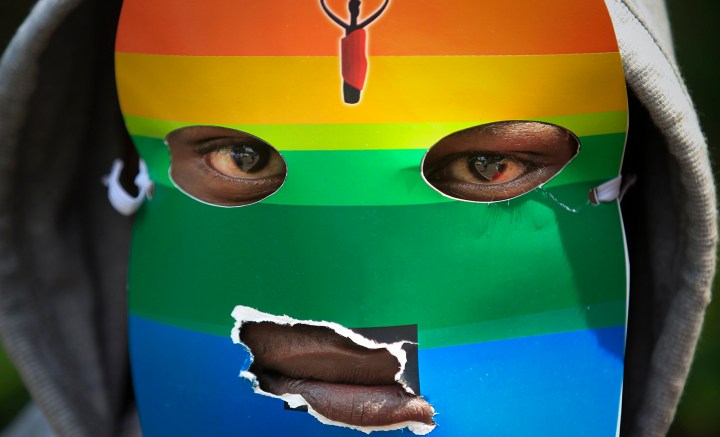
LGBTQ people in Uganda are under siege by a government that seems determined to stamp out sexual minorities, helped along by propaganda peddled by right-wing American evangelists.
The Anti-Homosexuality Bill that was passed by the Ugandan Parliament on 21 March 2023 threatens the safety of LGBTQ people, their families, communities, healthcare practitioners, teachers and others who do not report gay people to the police.
Since the adoption of the bill – which has yet to be signed by President Yoweri Museveni – schools have been raided by mobs hunting down LGBTQ learners, along with teachers and headmasters. Similar things have happened in other places.
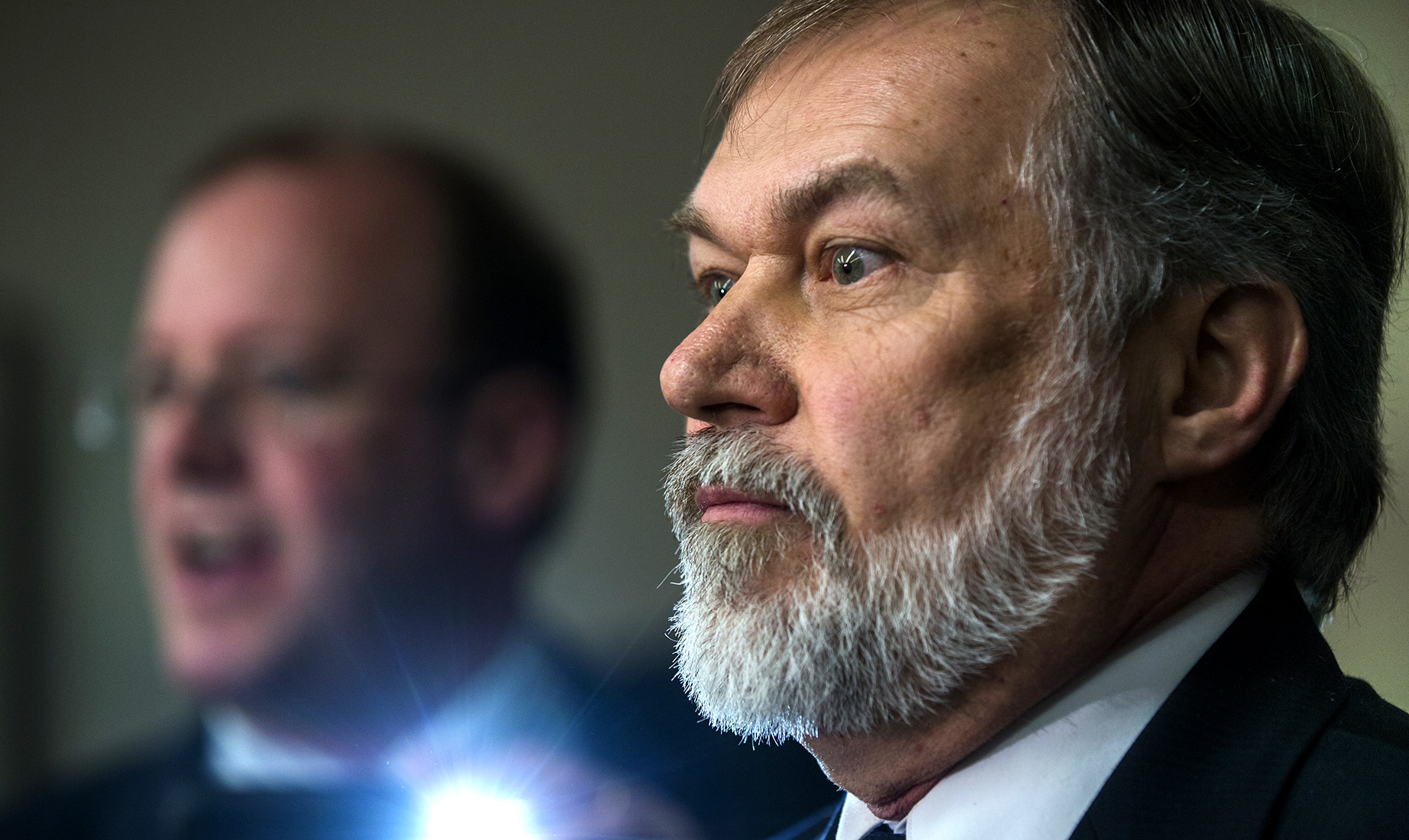
Scott Lively (R), president of the controversial anti-LGBT rights group Defend the Family International,’and Peter LaBarbera (L), communications director of another anti-LGBT rights group, called Americans for Truth About Homosexuality. (Photo: EPA / JIM LO SCALZO)
US evangelical pastor Scott Lively travelled to Uganda to meet with government officials and spread propaganda that homosexuality is a Western disease that must be fought.
This political weaponising of sexual orientation and gender identity is what Mark Gevisser refers to when he writes in his book, The Pink Line: Journeys Across the World’s Queer Frontiers, that queer people have become politically instrumentalised as “embodiments of progress and worldliness to some, but stigmata of moral and social decay to others”.
The homophobic laws being introduced in Uganda and other places around the world make queer people scapegoats in a system of lies by right-wing politicians trying to cling to power. This policing, control and exploitation of sexual minorities and gender-diverse people is a colonial project of a kind.
“The homophobia and transphobia we are seeing towards queer and trans persons in Uganda are peddled by extreme American evangelicals. Just last week we had American evangelicals in Uganda attending the Inter-Parliamentary Conference on African Values for 23 African countries,” said Dr Frank Mugisha in an interview with Democracy Now!
“The agenda for this conference was anti-gay and anti-gender. In fact, some of the African members of Parliament who attended this conference are trying to introduce similar legislation in other countries. For example, a [Kenyan] member of Parliament was in Uganda attending this conference that was heavily supported by American evangelicals, and is now trying to introduce similar legislation in Kenya.”
In 2020, OpenDemocracy found that 20 American religious organisations spent at least $54-million advocating against LGBTQ rights, safe abortions, access to contraceptives and comprehensive sex education. Almost half of it was spent in Uganda alone.
A bill ‘to protect the traditional family’
Uganda’s anti-gay bill was first introduced in October 2009 “to protect the traditional family” by prohibiting same-sex relations. In 2014, it was annulled due to a technicality — there was no quorum when it came to voting on the bill. Years later, the new bill has now been passed and awaits President Museveni’s signature.
Museveni has called LGBTQ people “deviants” and asked Western countries to stop lecturing African leaders on morality.
According to the bill, anyone who identifies as gay can face life imprisonment, up to 14 years imprisonment for attempted homosexuality, 20 years for promoting homosexuality and a potential death sentence for repeat offenders. Children under 18 can be jailed for up to three years for identifying as LGBTQ.
People providing healthcare services would be compelled to report any LGBTQ people who seek medical care. Landlords with LGBTQ tenants could face imprisonment or the death penalty if found guilty on more than one count. Journalists reporting on the human rights violations of LGBTQ people and activists doing HIV outreach work are considered to be “promoting homosexuality”.
“The bill aims to criminalise advocacy for the promotion of LGBT persons – it seeks to erase the entire livelihood of every LGBT person in Uganda,” said Dr Frank Mugisha, activist and director of Sexual Minorities of Uganda (SMUG). The Ugandan government recently shut down SMUG as part of the silencing of LGBTQ activists ahead of the new bill.
Many LGBTQ youngsters have been thrown out of schools, disowned by families and lost jobs and opportunities. A couple of them have been beaten, especially in the slums. Homes have reportedly been raided by local authorities.
“We are worried that we will see mob justice if this legislation is passed. We are seeing communities burning schools where perceived LGBTQ people work. We are seeing workshops and events getting raided … people being arrested and undressed, transgender persons getting stripped on national television … the situation has gotten worse in recent months,” explained Mugisha.
The UN High Commissioner for Human Rights, Volker Türk, has condemned the bill, saying, “If signed into law by the President, it will render lesbian, gay and bisexual people in Uganda criminals simply for existing, for being who they are. It could provide carte blanche for the systematic violation of nearly all of their human rights and serve to incite people against each other.”
Growing up queer in Christian Uganda
It was tough enough being queer in deeply religious Uganda, and already illegal before the new draconian law was even passed. The popular yet false idea that homophobia is un-African and goes against African family values has permeated the hearts and minds of many Ugandans.
It is homophobia, not homosexuality, that was introduced by the West, with King Henry’s penal code in 1950 criminalising “sexual acts between persons of the same gender”.
Uganda being a deeply religious state provides fertile ground for the perpetuation of Christian and colonial notions that homosexuality goes against God’s ways and nature. It is no wonder that homophobic slander is a regular staple in Ugandan churches.
A queer feminist woman in Uganda recalls growing up in the church, watching the pastor aggressively march back and forth across the stage as the congregation launched into a babel of tongues casting out “demons of homosexuality” in Uganda.
Another one notes that Catholic primary school girls who were suspected of being lesbians would be caned in front of everyone during school assemblies.
“I always fought my desire for other girls because I thought it was unnatural,” she said.
Being queer & out in Uganda today
Being an LGBTQ activist since the bill was introduced has been intense and stifling, says one anonymous activist. Many activists and allies have been forced into virtual hiding, away from public scrutiny, with some even having to close down their places of business.
Violations have spiralled in semi-urban and rural areas and online violence has spread, especially against those who channel their advocacy efforts through the internet.
“Going forward, there is going to be a heavy cost for each of us to maintain our stance on who we are and the humanity we believe in,” said one activist who asked not to be named.
“Being black and queer is a death sentence. You are hunted for being black and hunted for being queer. It feels like visibility without protection,” says Papa De, a Joburg-based queer Ugandan photographer.
“However, we have been strengthened by our community itself – the unity, support and solidarity from the allies have also been tremendous. The bill wants to put an end to LGBTQ activism, but how do you stop a passion except with death? Because, for some activists like myself, this is my life. Literally,” she said.
Despite the threat to personal safety, many refuse to hide or deny the truth of who they are.
“I am the gayest human in my home area. Kindly publish it, even on a billboard. I’m tired of homophobes and transphobes who can’t even process that people aren’t ‘recruited’. I’m so angry. Publish this anywhere. I totally consent,” read a message forwarded to me by a Ugandan journalist.
“Even my traditional parents accept me. Who the fuck are they to say a thing? I’m doing this for all of us. I’m a tiny man. They can’t catch me.”
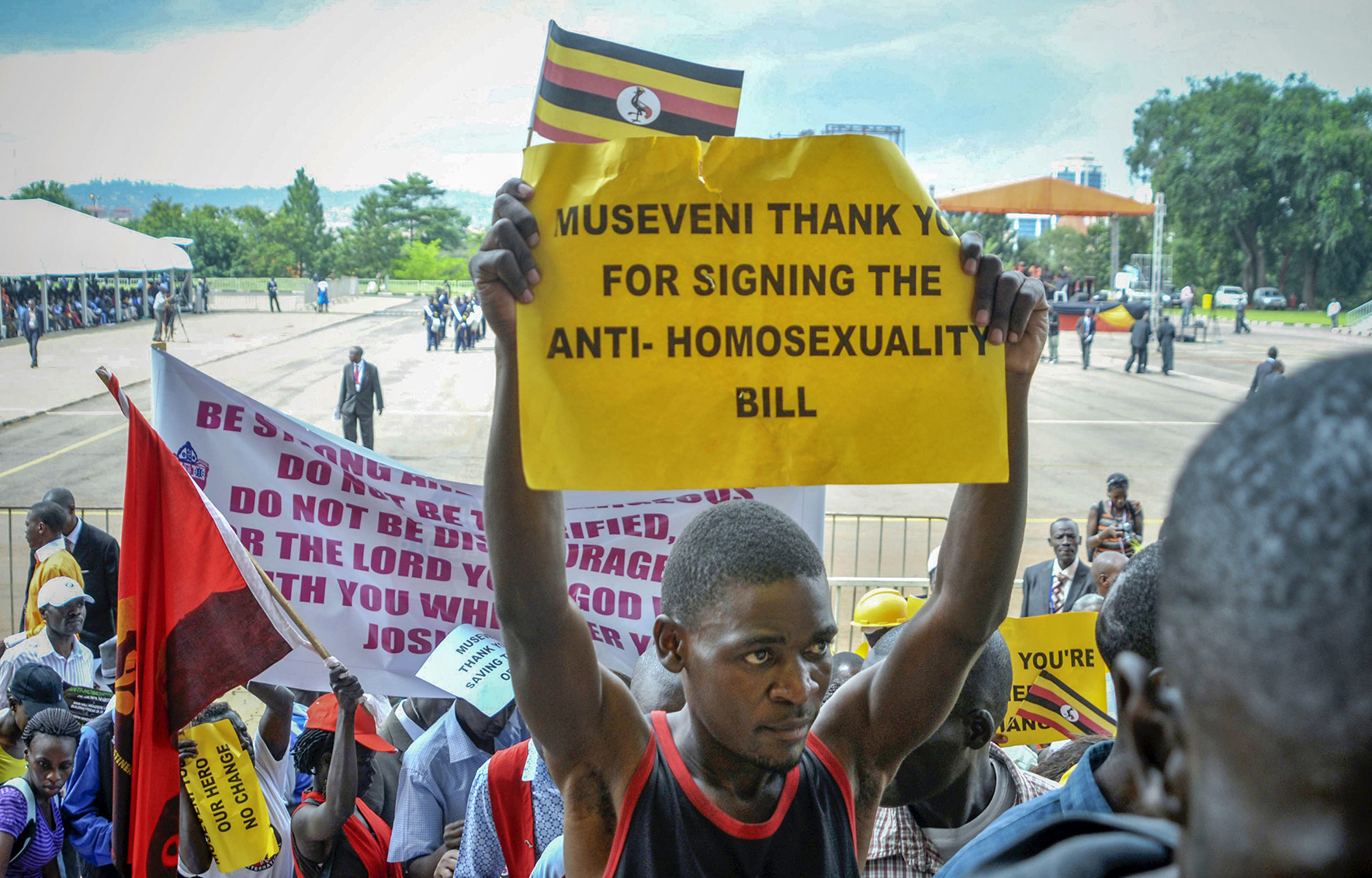
A participant holds up a sign during a so-called thanksgiving event to celebrate and thank President Yoweri Museveni for signing the anti-homosexual bill into law in Kampala, Uganda, 31 March 2014. (Photo: EPA/RONALD KABUUBI)
A matter of life or death
Activists have been killed in Uganda, including David Kato.
Many continue to face increased violence. There are arrests going on right now, especially in schools. Most people are being arrested for being perceived as being homosexual, or for defending homosexuality.
On the eastern side of Uganda, in Jinja, many matrons are arrested and detained for promoting homosexuality in schools. Some teachers were arrested for promoting homosexuality at an all-girls school, and some parents have come out to prevent the education of girls who have been accused of homosexuality.
These parents also want the death penalty imposed on these matrons, teachers and principals
“Some parents are so furious … I remember at a police station, some people asked the police for names so they could go beat and kill the so-called perpetrators,” said an anonymous source.
Three weeks ago, a student was arrested for allegedly being involved in homosexual acts with other students. The parents went to the police and asked for their child to be forgiven so that he could go back to school. According to a source, the police refused because homosexuality is not allowed in Uganda and they were waiting for the president to sign this bill so that the pupil can account for being involved in homosexuality.
A doctor from a healthcare facility in Uganda said they previously had many LGBTQ people coming for treatment, but after the bill was passed, more and more LGBTQ people are in hiding and are afraid of going to healthcare facilities for fear of arrest.
Digital security for many has been compromised due to surveillance and data breaches.
If this bill is signed into law, everyone will be under attack. Those “straights” promoting this bill choose to plead ignorance, or just don’t know it yet, but they will also be affected.
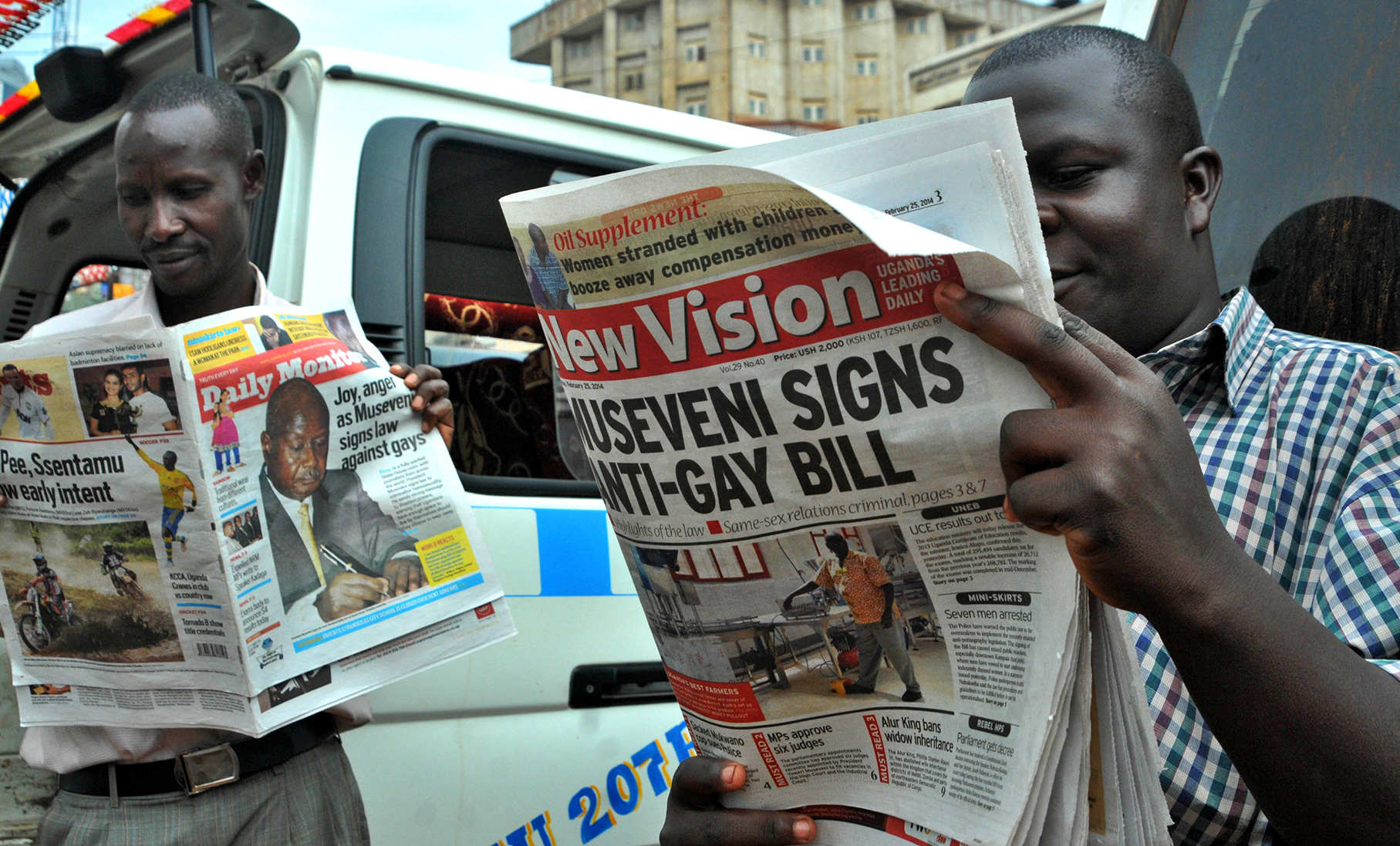
Ugandans read daily newspapers on 25 February 2014 with headlines and images of Ugandan President Yoweri Museveni signing the anti-gay legislation in Kampala, Uganda, 24 February 2014. (Photo: EPA / RONALD KABUUBI)
Media freedom in Uganda
Many journalists and media houses have had a field day spreading propaganda and misinformation and fuelling negative and biased reporting on gender and sexual minorities. The journalists who are reporting on human rights violations are in danger of being charged with promoting homosexuality.
Criminalising the “promotion of homosexuality” means any editor, journalist, publisher or film director who discloses and identifies a queer person without reporting them to the police, could be imprisoned or fined up to 100 million Ugandan shillings. Journalists are scared of doing their jobs.
A journalist in Uganda told me in a call, “I don’t think we will be able to produce stories and be the voice of the voiceless, as we have been. In addition to our safety, we will also not get information because human rights activists will also face imprisonment if they … speak. We will not be able to tell stories and fight for the rights of others in Uganda.
“I interacted with some government officials last week and they said if we go ahead and produce stories about the arrests and attacks that are going on since the bill was introduced, then we are promoting homosexuality. They don’t want us to report on the arrests,” she added.
When the journalist approached a healthcare official for information about LGBTQ people in Uganda for a story she was writing, she was told, “Do you want me to get arrested and killed in Uganda right now?”
Even human rights activists have said, “please, we cannot come out to speak about anything regarding homosexuality right now”.
One activist said, “I am appreciative of a few media outlets and personalities that have shared our opinion pieces and features as we shared with them, and allowed us the small space of freedom of expression from our end, despite the censorship and threats of violence from every corner.
Kuchu Times is a media initiative for and by LGBTQ people in Uganda. It was formed to challenge the negative reporting by mainstream media by sharing positive stories from the gay community.
If the new bill becomes law, Kuchu Times and similar media will face serious problems.
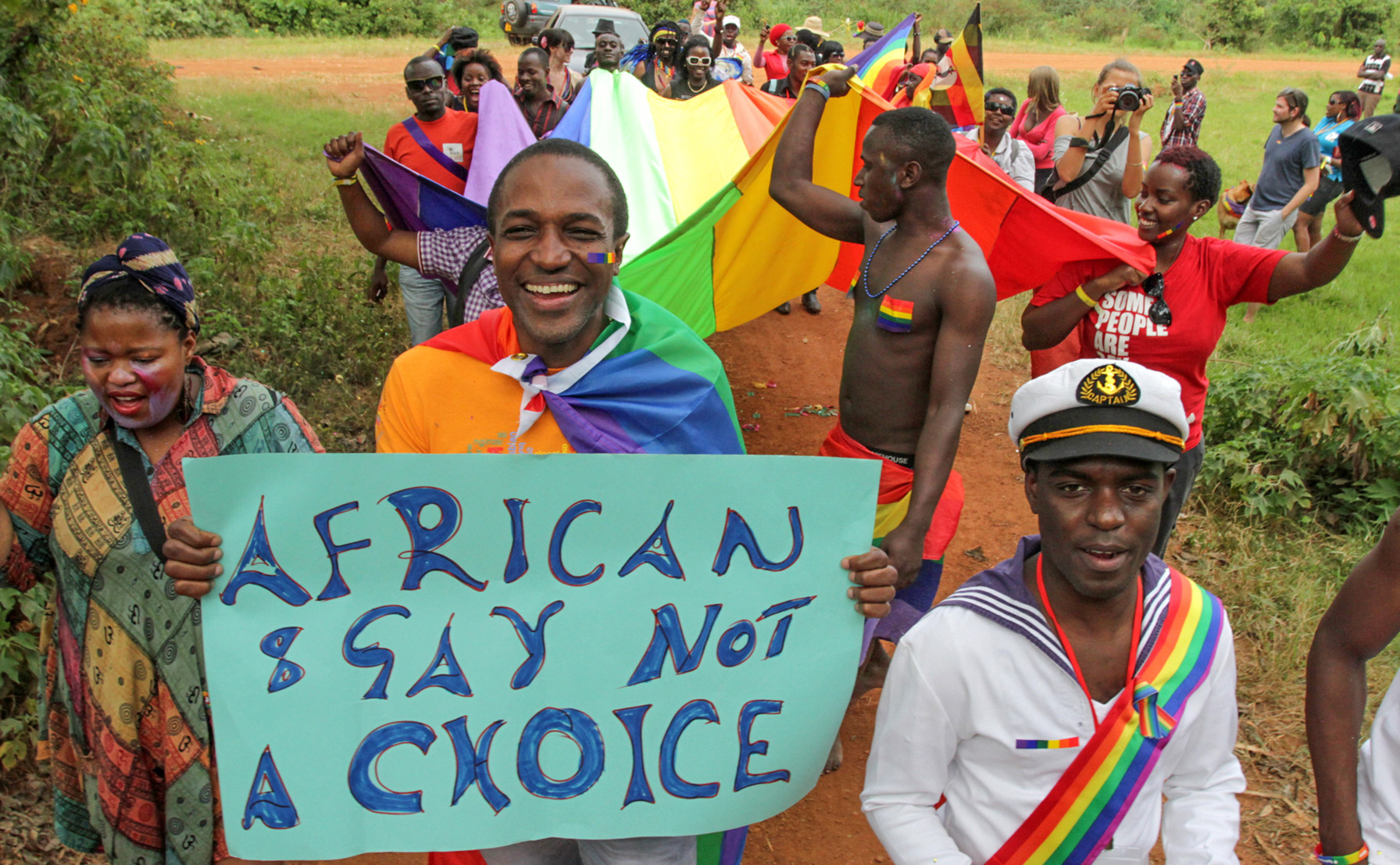
Gay and lesbian activists attend Uganda’s first gay pride parade at the Entebbe Botanical Gardens in Kampala, Uganda, 4 August 2012. (Photo: EPA / RACHEL ADAMS)
The global spread of homophobia
Other African countries could soon follow Uganda’s example. Ghana has recently introduced anti-gay laws and Kenya is following the same path. A similar bill has been introduced in Tanzania’s Parliament.
Anti-gay propaganda and anti-gay laws are increasingly appearing throughout Africa.
Read more in Daily Maverick: Progress and setbacks on LGBT rights in Africa — an overview of the last year
The problem isn’t restricted to Africa. According to the American Civil Liberties Union, there have been 120 anti-LGBT bills introduced in the United States this year alone.
A plea to the South African president
My personal plea to the president of the Republic of South Africa, Cyril Matamela Ramaphosa, is to talk Ugandan president, Yoweri Museveni, out of signing this bill into law.
When Simon Nkoli was asked to give an address in New York for the International Lesbian and Gay Association on the 25th anniversary of Stonewall on 27 June 1994, he said: “It is with so much pride that I tell you that when President Mandela made his victory speech on the Grand Parade at Cape Town, speaking to almost as many people as are gathered here today, he made a point of saying that discrimination against gays and lesbians will no longer be tolerated in South Africa.”
Read more in Daily Maverick: It is vital for South Africa to oppose Uganda’s dangerous anti-gay bill
I implore Ramaphosa to remind Museveni that discrimination against gays, lesbians, trans and non-binary people must not be tolerated. And to educate him about the call for freedom, as stated in the Freedom Charter:
“The People Shall Govern!
All Shall Have Equal Rights!
The People Shall Share In The Country’s Wealth!
The Land Shall Be Shared Among Those Who Work It!
All Shall Be Equal Before The Law!
All Shall Enjoy Equal Human Rights!
There Shall Be Work And Security!
The Doors Of Learning And Culture Shall Be Opened!
There Shall Be Houses, Security And Comfort!
There Shall Be Peace And Friendship!
THESE FREEDOMS WE WILL FIGHT FOR, SIDE BY SIDE, THROUGHOUT OUR LIVES, UNTIL WE HAVE WON OUR LIBERTY”.
Solidarity with LGBTQ people in Uganda
We’ve had waves of homophobia in Uganda, but this bill is a well-curated and well-funded campaign against the rights of LGBTQ people. We must fight and push back for our brothers and sisters – if we can’t do it for our own, no one else will.
No revolution was won without solidarity. Use your voice to stand up for equality and against hate towards LGBTQ people in Uganda. Join platforms like #WhatsNext, where you can learn about the situation in Uganda and the plight faced by other oppressed sexual minorities.
#WhatsNext was created by Ugandan photographer Papa De, who has been an active link in the response to the situation in Uganda. So far, they have raised 24-thousand euros – most of it has been sent back to Uganda to help LGBTQ people who are scrambling for food, medical care and housing.
They have partnered with artists such as Athi-Patra Ruga, Lady Skollie and others to host an art fundraiser this weekend at Lang de Moun Mon in Johannesburg at 2pm.
“The youth has been uneducated and unbothered to learn about the difficulties of others, because they are supported by laws here,” said De from his Johannesburg home.
He believes solidarity starts with taking the time to learn about the lived experiences of queer people in other countries, and following the voices of activists who are putting themselves on the line. DM/MC
Welcome Mandla Lishivha is a journalist and author of Boy On The Run and researcher for GLOW: The Life and Trial of Simon Nkoli: a Vogue Opera, a musical opera on the life & trials of anti-apartheid and gay activist Simon Nkoli, composed by Philip Miller.

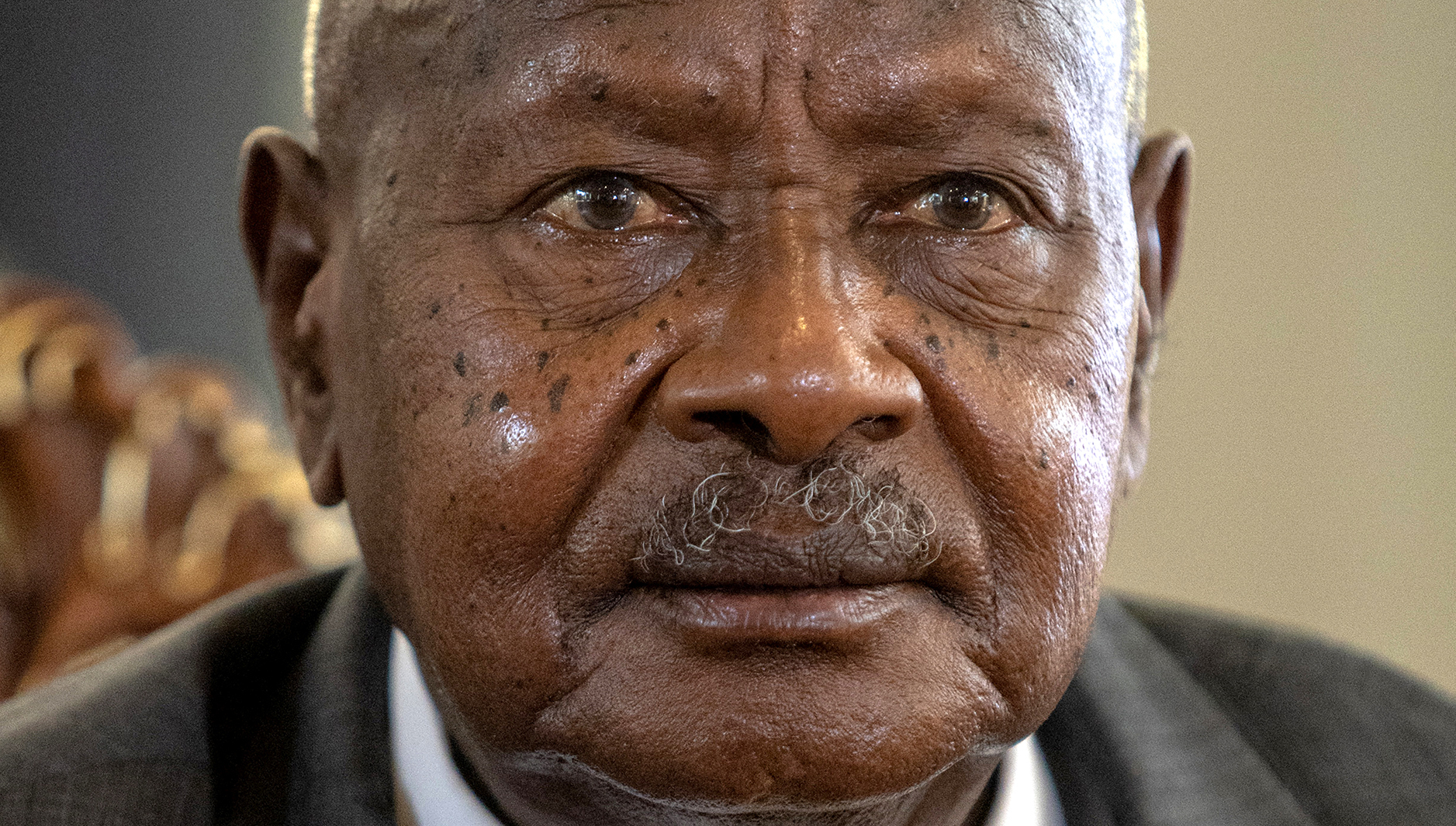
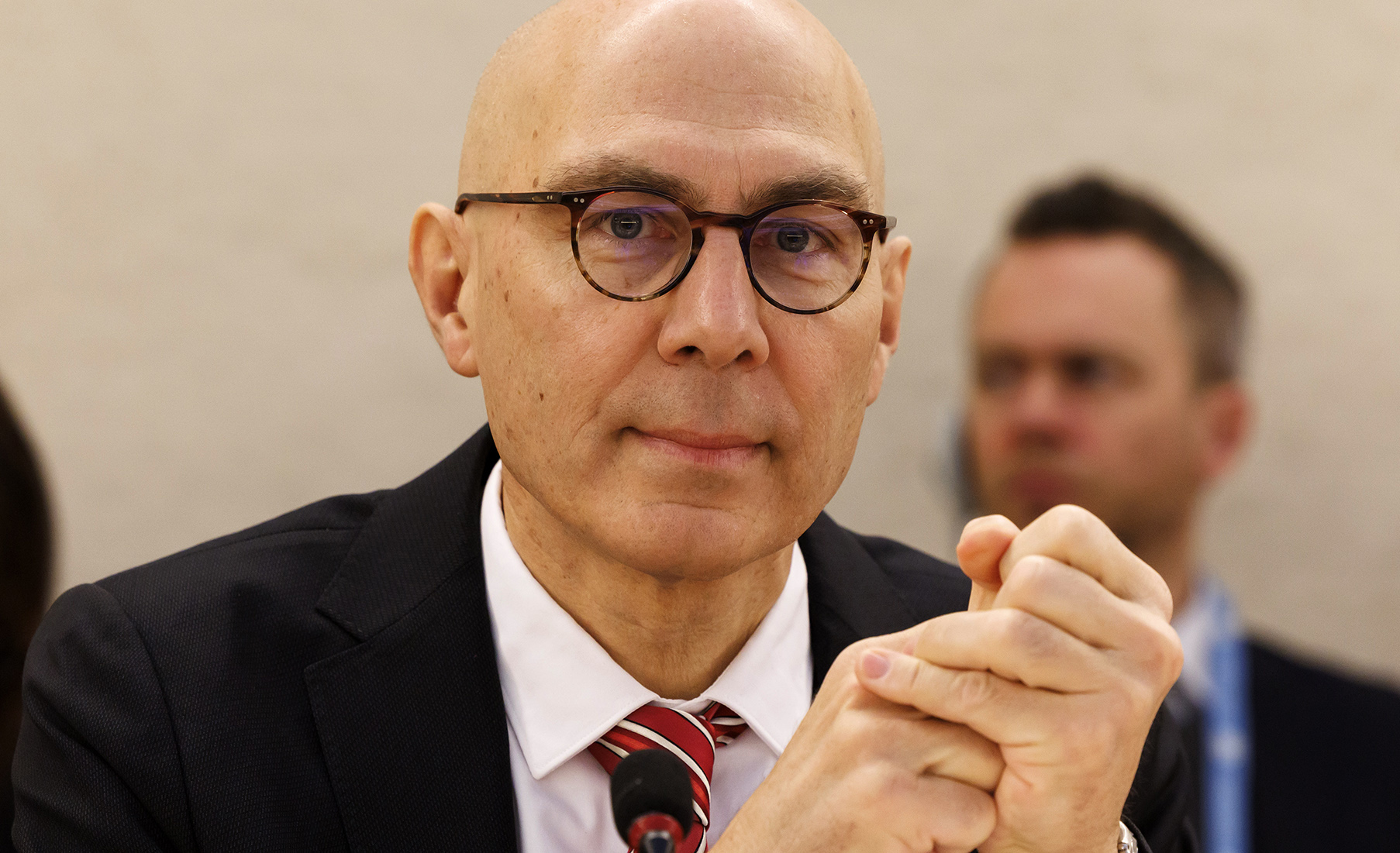



















 Become an Insider
Become an Insider
Comments - Please login in order to comment.